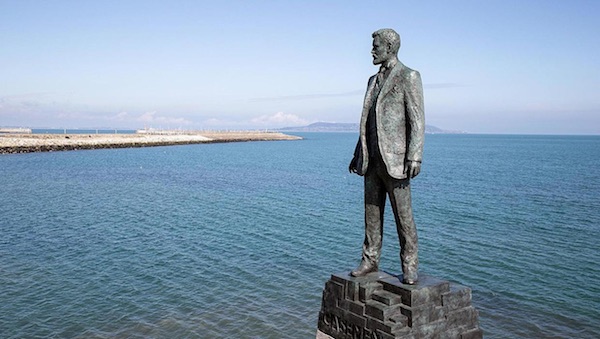
A three-metre tall statue of Irish revolutionary Roger Casement has been installed on the south Dublin coast near the place of his birth. Using cranes at Dún Laoghaire Baths, the bronze sculpture of Casement was placed high on a plinth.
Born in Sandycove in 1864 to an Anglo-Irish family, Casement was hanged for treason for his part in the 1916 Rising. Dún Laoghaire Rathdown County Council noted that Casement’s last sight of Ireland was from the boat departing its harbour as he was transferred to London to stand trial.
The chairperson of Dún Laoghaire Rathdown County Council, Lettie McCarthy, said she felt “a great sense of emotion” as she watched the statue be lifted into place.
“It is a remarkable piece… We finally brought him back to Dún Laoghaire,” she said.
“You couldn’t have picked a better spot for it… Even the shape of his jacket looks like the water from the sea is blowing it. It is very iconic,” Ms McCarthy noted.
The bronze statue was created by sculptor Mark Richards, who secured the commission following a council competition.
The council described Casement as an “extraordinary Irishman who used his voice to challenge the status quo and the unchecked exploitation of people and natural resources”.
The son of Captain Roger Casement of the British Army and Anne Jephson from Mallow, County Cork, he entered the British Foreign Service in 1892. Casement earned an international humanitarian reputation for his efforts in exposing the exploitation and abuse of natives in the Congo and Peru.
Knighted by the British state, he became drawn to Irish nationalism, resigning from a comfortable state position to devote himself to the independence and anti-colonist cause.
However, his mission to secure German support for the Easter Rising led to his arrest upon his return to Ireland.
In April 1916, Casement was captured by British forces after trying to smuggle 20,000 German rifles into Ireland near Banna Strand, County Kerry. He was subsequently hanged and buried in an unmarked grave in Pentonville Prison in London on August 3 that year.
Campaigns sought the repatriation of his remains for burial, which came to pass half a century after his death. An elaborate State funeral was held on March 1st, 1965, before his remains were interred in Glasnevin Cemetery in Dublin.
However, a new effort is currently underway to reinter his remains in County Antrim, as his last wish was to be buried at Murlough Bay on the North Antrim Coast.
A recent commemoration to mark the 105th anniversary of Easter Rising leader Roger Casement’s death was accompanied by a call to reinter his remains in County Antrim. That request was previously denied by former British Prime Minister, Harold Wilson, who feared reburial there would provoke “Protestant reactions”.
A committee made up of members of Casement Social Club came together in honour of his anniversary last month.
The commemoration – which coincided with wreath-laying ceremonies in Banna Strand, Glasnevin, Murlough Bay, and Pentonville Prison and his native Sandycove – saw campaigners renew the call to “bring his remains home”.
Committee member, Jude Whyte, said: “Our campaign has one simple objective, and that is to abide by Casement’s wishes and bring his remains back from Glasnevin Cemetery to Murlough Bay.”
“At the time there was an understanding that he wouldn’t come North because of unionism, but his final wishes were to be buried in Murlough Bay because he had lived some of his life there in a place called Carey,” he said.
“There is not political aspect to this outside of that.”
The campaign, which has the backing of Casement’s descendants, will seek to engage with various official stakeholders to make the reinterment a really.
“Covid has held things up because meeting the main players has been difficult,” Mr Whyte said.
“As these restrictions lift we’re simply going about a systematic campaign to get the Irish Government, Glasnevin Cemetery Trustees, and the National Trust who own the land up there to agree to this.”
![[Irish Republican News]](https://republican-news.org/graphics/title_gifs/rn.gif)
![[Irish Republican News]](https://republican-news.org/graphics/title_gifs/harp.gif)

